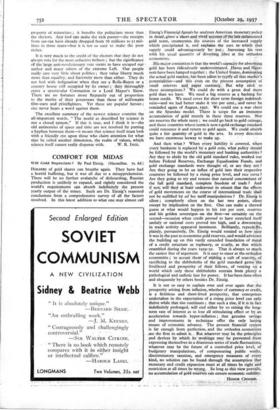COMFORT FOR MIDAS .
Will Gold Depreciate ? By Paul Einzig. (Macmillan. 7s. 6d.) HOLDERS of gold shares can breathe again. They have had a, horrid buffeting, but it was all due to a misapprehension. There will be no further avalanche of dishoarding, Russian production is unlikely to expand, and rightly considered the world's requirtMents can absorb indefinitely . the present yearly output of the mines. Such are Dr. Einzig's reasoned conclusions from a comprehensive survey of all the factors involved. In this latest addition -to what one may almost call
Einzig's Financial Annals he analyses American monetary policy in detail, gives a shortand- vivid appinit Ofthkrafe finiaMented gold scare, enumerates-..the sources of the increased supply which precipitated it, and explains the uses to which that supply rould advantageously be put ; leavening his text with his usual quantity of diverting jibes at the orthodox economists.
His major contention is that the world's capacity for absorbing gold -has been ridiculously underestimated. Raves and }fie- nott have been lumped together ; the United States, dominating the actual gold market, has been takennto-typify all that market's potentialities—and this even on the present assumption of small reserves and • paper currenc-y.: But why stick to these assumptions ? We could do with a great deal More gold than we have. We need a big reserve as a backing for home credit. We need cover for short term foreign indebted- niss—and we had better make it too- per cent, and never be reminded again of August,193t. We could use a war- chest on the Spandau model. There is scope for an immense accumulation of gold merely in these three reserves. Nor are reserves the whole story ; we could go b'ack to gold coinage, and those countries whose norm is now a gold exchange standard could renounce it and return to gold again. We could absorb quite a fair _quantity uf gold in the arts. In every direction we have enormous leeway to make up.
And then what ? When every liability is covered, when every banknote is replaced by a gold coin, what policy should be followed by the world's-monetary and banking authorities ? Are they to abide by the old gold standard rules, worked out before Federal Reserves, Exchange Equalisation Funds, and gold exchange standards were thought of, or are they not ? Are they going to let an influx of gold into their respective countries be followed by a rising price level, and vice versa ? Are they going to try and restore that natural concomitant of the full gold standard, complete freedom of trade ? And if nor, will they alleait endeavour, ..ro ensure- _that the effects of gold movements on the course of international trade Shall not be nullified by ad hoc tariff manipulations ? Dr. Einzig is silent; completely silent on the last two points, silent except by implication on the first. One can make a shrewd guess at what would happen to his too per cent. reserves and his golden sovereigns 'On the first—sir certainly on the second—occasion when credit proved to have stretched itself unduly or national costs proved tOo high, and a downswing in trade activity appeared-imminent. Brilliantly, repeateily, plainly, persuasively, Dr. Einzig would remind us how easy it was in the past to economise gold reserves, and would advocate the building up on this vastly extended foundation of metal of a credit structure as topheavy, or nearly, as that which crumbled during the yeari 1929-31. That is always so much the easiest line of argument. It is easy to sneer at the orthodox economists ;' *to accuSt- them' of &liking a cult of scarcity, of sacrificing to- the shibboleths of the Aold standard game the livelihood and prosperity of their fellows, of venting on a world which only these shibboleths restrain from plenty a pathological and sadistic lust for power. It has been done often and eloquently by others besides Dr. Einzig.
It is not so easy to explain over and over again that the prosperity arising from inflation, whether of currency or credit, is a fictitious and short-lived prosperity, that enterprises undertaken in the expectation of a rising price level can only thrive while that rise continues ; that such a rise, if it is in fact indefinitely prolonged, will end either by so raising the long- term rate of interest as to lose all stimulating effect or by an acceleration towards hyper-inflation ; that genuine savings and improvements in technique offer the only lasting Means of economic advance. The present financial system is far enough from perfection, and the orthodox econothists .are the first to admit it.. But whatever may be the principles and devices by. which its wca:kin_gs may_ be prevented from expressing themselves in a disastrous series of trade fluctuations, whatever may be the future. of a controlled price level, of budgetary manipulations, of compensating public works, discriminatory taxation, and emergency measures of every kind, no solution can be: found • through the assumption that monetary and credit expansion must at all times be right and restriction at all times be wn?ng. So long as this view prevails, no accumulation of gold reserves can ensure economic stability.
HONOR CROWE:


























































 Previous page
Previous page